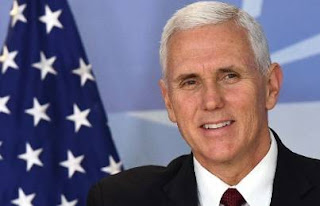 |
| U.S. Vice President Mike Pense |
U.S. Vice President Mike Pense is stressing the strength of the American alliance with South Korea hours after the latest failed missile test by Pyongyang.
Times are "challenging," but America's "historic alliance with the courageous people of South Korea has never been stronger," Pense said in Seoul during a fellowship dinner for relatives of U.S. troops based in South Korea.
“This morning’s provocation from the North is just the latest reminder of the risks each one of you face every day in the defense of the freedom of the people of South Korea and the defense of America in this part of the world,” Pence said.
Earlier Sunday, the vice president attended Easter church services with military service members.
According to the Associated Press, Pence’s mission on his first trip to South Korea is to explain to leaders in Japan, Indonesia, Australia and South Korea about a policy called “maximum pressure and engagement” aimed at increasing pressure on North Korea’s government.
Not much else has been revealed about the new policy.
The failed missile launch from North Korea'sport city of Sinpo came a day after a massive military parade in the North Korean capital that amounted to a show of force by the government of Kim Jong Un. However Pyongyang did not conduct a widely anticipated underground nuclear weapons test.
In Florida, President Trump expressed satisfaction with his offer to ease up on trade pressure on China in exchange for help in reining in North Korea's nuclear programs.
"Why would I call China a currency manipulator when they are woirking with us on the North Korean problem?" he tweeted. "We will see what happens!"
US evaluating launch
A short while after the launch, a statement from the U.S. Pacific Command said the missile blew up almost immediately and that its type was still being assessed.
The statement also reiterated Washington's full commitment "to working closely with our allies," particularly South Korea and Japan, to maintain security.
Vice President Pence was briefed on the failed launch during his flight to Seoul and conferred with the president, according to a statement from Pence's office.
Earlier this past week, as tensions worsened between Washington and Pyongyang, U.S. President Donald Trump ordered a U.S. Naval strike group headed by the USS Carl Vinson aircraft carrier to the Korean peninsula in show of force.
Pyongyang conducted two unauthorized nuclear test explosions last year and nearly two dozen rocket launches in a years-long push to expand its nuclear weapons and ballistic missile programs.
Pyongyang boasts of missile prowess
North Korean leader Kim declared in a speech on New Year's Day that his country's program to build inter-continental ballistic missiles had "reached its final stage."
Pyongyang has been under U.N. sanctions since 2006, along with an international arms embargo aimed at slowing its development of its banned nuclear and missile programs.
Since then, Washington and a vast majority of world governments have repeatedly demanded that the North denuclearize the Korean peninsula. Western leaders, however, have yet to devise a plan that would either compel the North to cooperate or create incentives for it to do so.
President Trump has in recent weeks pressed China to persuade its North Korean ally to curb its nuclear ambitions, but results of those efforts are not yet clear.
Trump also said he would not call China a “currency manipulator,” reversing a promise he pledged to do on his first day in office.
"Why would I call China a currency manipulator when they are working with us on the North Korean problem?" he wrote on Twitter. "We will see what happens!"
VOA's Steve Herman and Brian Padden contributed to this report.
This story first appeared on Voice of America & is reposted here with permission.
